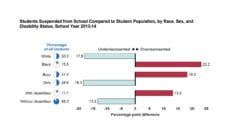Taking doors off bathroom stalls. Two-minute hallway passes. Parent teacher conferences. Detention. Many American high schools use these tactics to limit student substance use. But do they work? These strategies tend to prioritize punishment over rehabilitation. Diversion programs, in contrast, focus on reform.
Diversion programs include personalized counseling, community service involvement, and educational interventions individualized for young adults who are having trouble with substances. Diversion programs have proven highly effective in significantly reducing reoffending rates among participants. However, this effective intervention is infrequently implemented in schools.
Jessica Liu and colleagues studied how schools currently address adolescent substance use. They sent surveys asking Massachusetts school staff to gauge the effectiveness of a variety of strategies. The figure below illustrates the frequency with which each strategy was implemented and its perceived effectiveness according to school personnel.

All strategies listed in the figure are centered around punishment with the exception of diversion. While diversion is perceived as most effective, it is not frequently used. However, punishment-based strategies are often implemented but are seen as least effective. In the last decade suspension and expulsion have spiked 50%.
Liu’s team examined the barriers to establishing diversionary school-based programs. Schools in urban areas were most likely to implement punishment-based programs—a higher use of expulsion and suspension—over diversion programs. Urban schools often face limited financial support, understaffing, and insufficient time for staff training to support the resource-demanding diversion programs. The researchers recommend addressing barriers to the implementation of diversion programs, suggesting that such rehabilitative programs are vital for improving the outcomes of adolescents who struggle with substance use.
Databyte via Jessica Liu, Rebecca Butler, Amy Turncliff, et al. An Urgent Need for School-Based Diversion Programs for Adolescent Substance Use: A Statewide Survey of School Personnel. Journal of Adolescent Health, 2023.
Photo via Getty Images














